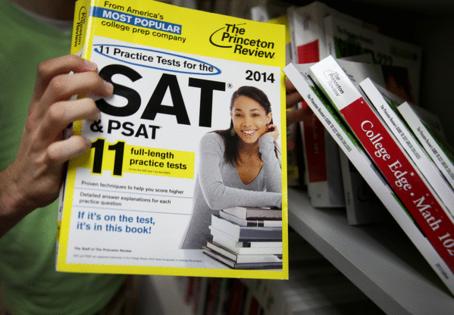Editorial: Dumbing down the SAT bodes poorly for education
Published in Op Eds
The SAT is billed as “a great way to find out how prepared students are for college.” If that’s true, recent changes to its format offer an unflattering assessment of the country’s aspiring scholars.
Colleges and universities have long used standardized tests to filter applicants. The SAT, published by the nonprofit College Board, was for decades considered the preeminent one. A nationwide industry arose to help kids prepare for the test and boost their chances of acceptance to a good school. The SAT’s influence over American education was hard to overstate.
Then the pandemic hit. As in-person exams became impractical, hundreds of schools dropped their testing requirements. The SAT and its main competitor, the ACT, lost millions of dollars in revenue. Although both recently started offering digital options, schools have been slow to reinstate their requirements. Today, more than 80% of schools remain test-optional.
“If students are deciding to take a test,” as one College Board executive put it, “how do we make the SAT the one they want to take?”
To anyone familiar with American teenagers, the company’s answer should come as no surprise: Make the test easier. The newly digitized format allows a calculator for the entire math section and drastically cuts reading comprehension. Gone are the 500- to 750-word passages about which students would answer a series of questions. Instead, test takers read 25- to 150-word excerpts — about the length of a social media post — and answer a single question about each.
To an extent, the College Board can be forgiven for acceding to student preferences. Its research shows the new format is equally rigorous, and proponents say reading comprehension is better reflected in other parts of a college application. The problem is that these revised standards reflect, and may perhaps worsen, some alarming trends in American education.
For college applicants, this has made for a dire combination. Little more than a third of 12th graders are proficient in reading, and 26% say they never read novels outside of school. By some accounts, many students now arrive on campus “functionally illiterate,” incapable of reading complex texts. The rampant use of artificial intelligence to complete assignments is unlikely to help.
Universities themselves have contributed to this trend by lowering their expectations. Responding to student complaints, professors have been slashing homework assignments, routinely extending deadlines and (most prominently) inflating grades. Nearly 80% of all grades awarded to Yale undergraduates in 2023 were an A or A-. The average GPA at Harvard is 3.8.
There’s plenty of blame to go around for these trends. But the SAT has long been a powerful symbol of academic ambition.
An effort by the College Board to reemphasize the benefits of deep reading — for critical thinking, for self-reflection, for learning of all kinds — might go a long way toward restoring some balance. It should build on efforts to incorporate college prep into school curricula, work with districts to develop coursework that builds reading stamina for all test takers, and consider reducing the cost of its subject-specific Advanced Placement exams that continue to test these skills (now $99), in line with the SAT ($68).
Schools, for their part, should recommit to teaching books in their entirety. Just 17% of third- through eighth-grade teachers primarily rely on whole texts; a quarter mostly use excerpts. University administrators should support tough professors and resist the temptation to placate grumbling undergraduates.
As it stands, the College Board risks undermining the value of a test that’s been remarkably effective at predicting college and career success. Dumbing down the SAT serves no one well, least of all students.
____
The Editorial Board publishes the views of the editors across a range of national and global affairs.
©2025 Bloomberg L.P. Visit bloomberg.com/opinion. Distributed by Tribune Content Agency, LLC.
























































Comments